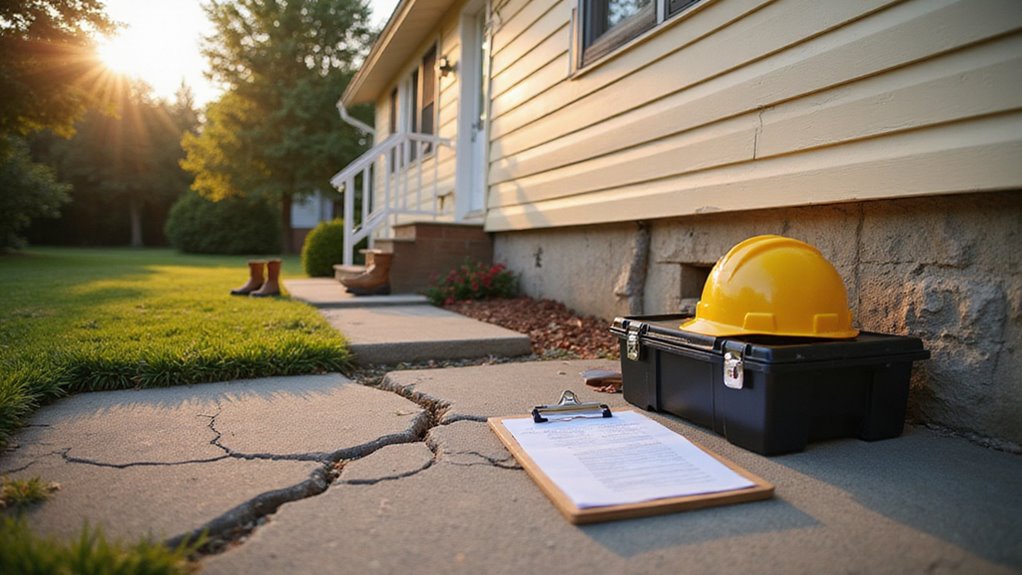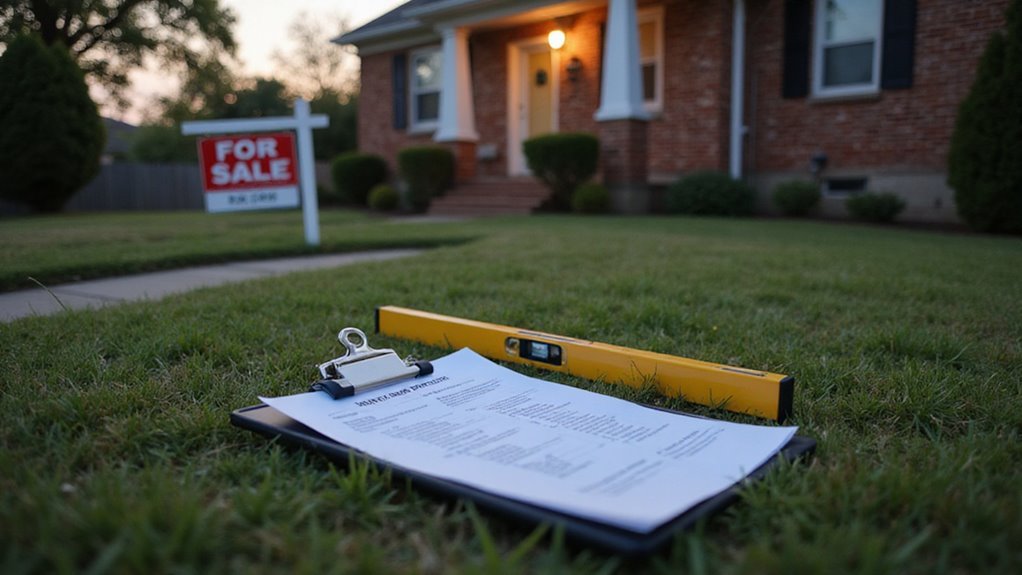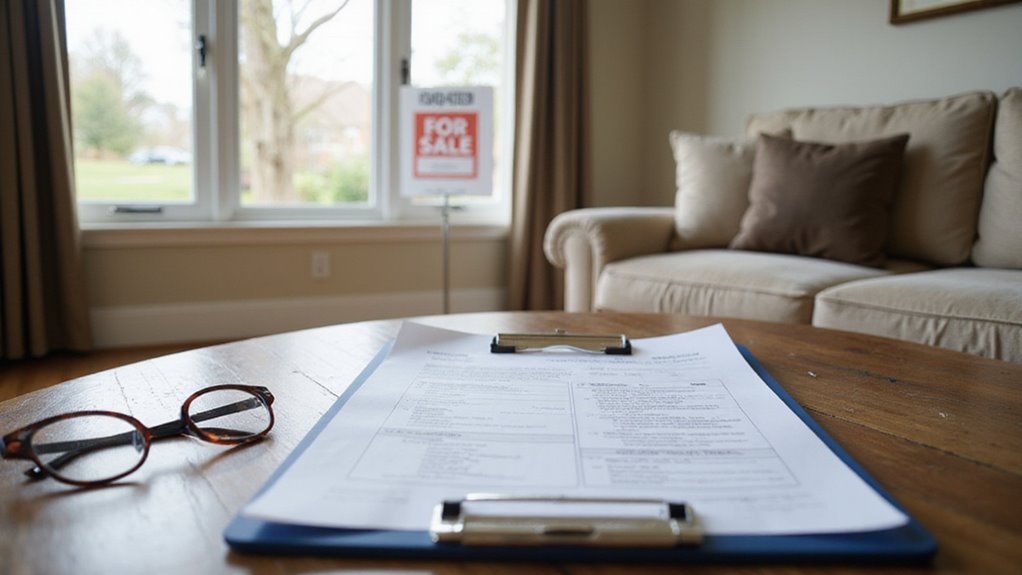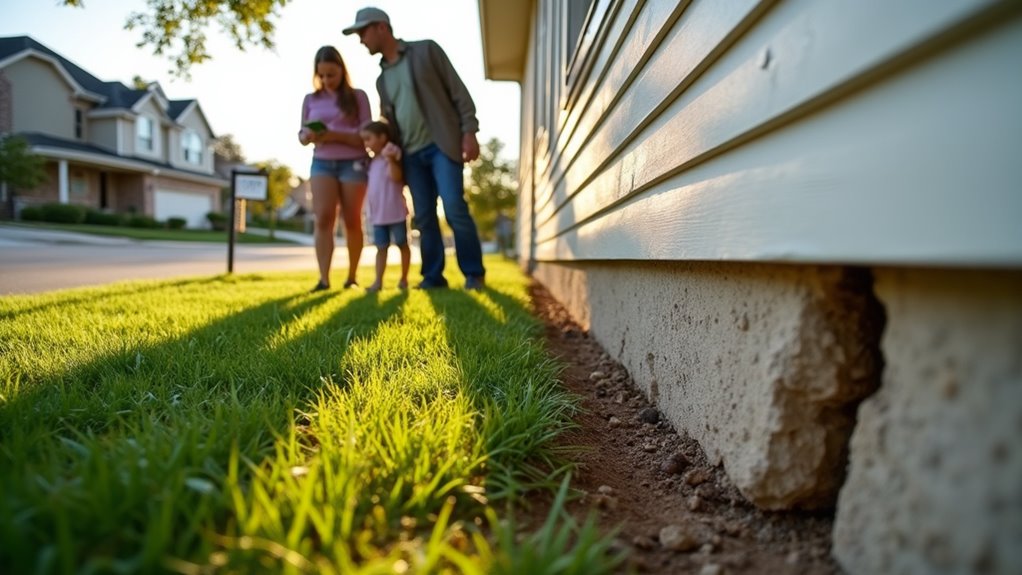Selling a house with foundation problems is stressful. You must decide if you should fix the damage or sell as-is. This choice affects your price, buyers, and how fast you sell.
Buyers often hesitate to make offers on homes with big issues. They might expect discounts or back out after inspections. Foundation damage can easily lead to long delays or failed sales.
The best option depends on your goals, money, and local market. Most sellers benefit from repairing foundation issues before listing their home.
Repairs attract more buyers and may help you sell faster and for more money. This blog will guide you through your options and help you make the best decision for your situation.
Key Takeaways
- Repairing foundation issues can increase your home’s value, attract more buyers, and simplify the sale process.
- Unrepaired foundation problems often lead to lower offers, longer time on market, and difficulty securing buyer financing.
- Professional repairs with warranties reassure buyers, while DIY fixes may not address underlying structural concerns.
- Selling as-is is faster but usually results in a lower sale price and appeals mainly to investors or cash buyers.
- Full disclosure of foundation issues is legally required and essential to avoid future disputes and build buyer trust.
Understanding Common Foundation Problems

Common foundation problems include cracks, settling, and uneven floors. These often happen due to poor soil, drainage issues, or bad construction. If left unchecked, they can weaken your home’s structure. In Staunton and nearby areas, sellers sometimes benefit from direct cash purchases of homes with these issues, avoiding the need for costly repairs.
Foundation issues may start small but can become serious over time. Regular checks help spot problems early. If you notice cracks or sticking doors, you should seek professional advice.
A professional assessment can find hidden issues before they get worse. This helps fix the real cause, not just the symptoms. If you keep up with maintenance, you protect your home’s value and avoid expensive repairs.
In Virginia, foundation issues disclosure is required by law when selling, so understanding specific problems and their causes is important for transparency and a smooth transaction.
Signs Your Home Has Foundation Issues
Foundation issues can harm your home’s structure. Cracks in walls, ceilings, or floors often indicate a problem. Doors or windows that stick or will not close can mean the foundation is shifting.
Uneven or sloping floors may point to movement below the house. Gaps around window frames or doors can show settling issues. Separation between walls and ceilings is also a warning sign. Identifying these symptoms early can help you avoid overpricing or undervaluing your home when preparing it for sale.
If these problems appear, a professional should inspect your foundation. Early repairs can prevent more damage. Timely action can help keep your home safe and strong. Addressing foundation problems before selling can also boost curb appeal and attract more buyers, much like staging other parts of the home for a quick sale.
How Foundation Problems Affect Home Value

Foundation problems can lower your home’s value. Buyers and appraisers see cracks or uneven floors as warning signs. If these issues exist, your home may get lower offers.
Lenders might not finance homes with foundation damage. Insurance companies could raise rates or deny coverage if they notice such problems. Appraisers may also reduce your home’s appraised value.
Even if the rest of the house is in good shape, foundation problems can scare buyers away. If repairs are needed, you may wait longer to sell. Homes with foundation issues often attract only cash buyers or those looking for investment properties, limiting your pool of potential buyers.
Some buyers might avoid your home entirely if they see major cracks or settling. In Virginia, ignoring foundation problems may also lead to building code violations, which can create legal complications and further reduce your home’s appeal to potential buyers.
What Buyers Think About Foundation Damage
Most buyers see foundation damage as a serious problem. They often worry about safety and the stability of the home. If there are foundation issues, buyers may lose interest in your property.
Foundation damage raises concerns about future costs and possible repairs. Buyers know that fixing these problems can be expensive. They may also worry about hidden issues. Many buyers appreciate when houses are purchased in any condition, as this removes their anxiety about needing to tackle unknown repairs.
Insurance companies may refuse coverage if the house has a history of foundation problems. Some may increase premiums or add strict conditions. If buyers expect trouble with insurance, they may offer less or walk away.
Even small cracks or signs of movement can scare buyers. If buyers feel uneasy about the foundation, they usually want a lower price. Your home’s value depends on how safe buyers think it is.
Buyers and lenders may also require professional safety assessments before moving forward with a sale, especially if foundation issues are suspected.
Costs Associated With Foundation Repairs

You’ll find that foundation repair costs can range widely depending on the type and extent of the damage. Factors like soil conditions, repair methods, and the size of your home all play a role in determining your final bill. While tackling minor fixes yourself might seem cost-effective, you need to weigh those savings against the quality and guarantees that come with hiring a professional.
It’s also important to consider whether there are any property liens that might add to your expenses or delay your sale if repairs aren’t addressed properly. If selling as-is is appealing, some cash home buyers in Stuarts Draft, VA will purchase your house regardless of its foundation issues, allowing you to skip expensive repairs altogether.
Typical Repair Price Ranges
Foundation repair costs depend on the type and severity of the problem. Minor repairs may cost as little as $500 to $1,000. Major fixes can total $10,000 or more.
Most people pay between $2,500 and $7,000 for moderate repairs. Costs can change if the damage is more severe or if extra work is needed. Repair warranties may also add to the final price.
Here’s a quick look at typical foundation repair prices:
| Type of Repair | Typical Price Range |
|---|---|
| Minor Crack Filling | $500 – $1,000 |
| Moderate Reinforcement | $2,500 – $7,000 |
| Major Structural Correction | $7,000 – $15,000+ |
If you know these price ranges, you can plan your budget better. This helps you make smart choices before selling your home.
Factors Influencing Repair Costs
Repair costs depend on several important factors. The amount of foundation damage is the biggest influence on price. Small cracks cost less to fix than major structural problems.
The kind of foundation also affects the cost. Slab, pier and beam, and crawlspace foundations use different materials and methods. Each type needs a different repair approach.
Soil and drainage conditions around your home can increase expenses if improvements are needed. Difficult access to the damaged area raises labor costs. Local labor rates and permit fees can also change the final price. If you understand these factors, you can make a better estimate for your repair costs.
Comparing DIY and Professional
DIY foundation repair may save money at first, but it carries risks. Professional repairs fix deeper problems and protect your investment. If you want lasting results, hiring a pro is usually safer.
Professionals use special tools and know how to spot hidden issues. They often provide warranties to give future buyers peace of mind. If you do the repairs yourself and miss something, it could hurt your home’s value.
Buyers and inspectors carefully check any foundation work. Poor repairs can cause problems during the selling process. If you want to avoid complications, professional help is a better choice.
Weighing the Pros and Cons of Repairing

Repairing your foundation has both good and bad sides. Fixing problems now can help you sell your home more easily. It may also allow you to ask for a higher price, since buyers trust homes with recent repairs. Adding to this, being transparent about past repairs and disclosure requirements upfront can increase buyers’ confidence and help streamline negotiations.
Foundation repairs can cost a lot of money and take a long time. You might not get all your money back when you sell. If repairs take longer than planned, your sale could be delayed.
You should think about your local housing market before spending on repairs. If buyers in your area care about foundation work, repairs may be worth it. If not, it may be better to sell as-is.
Keep in mind that selling a home as-is often means accepting a lower sale price because buyers factor in the perceived risks and expected repair costs.
Selling a House As-Is With Foundation Issues
Selling a house as-is with foundation issues means buyers must accept the property in its current condition. This option often attracts investors or buyers who are comfortable with repairs. You may not get top dollar, but you can sell faster. Setting a realistic price by referencing recent sales data in Virginia can help your listing attract more interest even with known foundation problems.
Sellers should be honest about foundation problems in the listing. Clear disclosure builds trust and avoids legal trouble later. Some buyers may appreciate your honesty and still make an offer.
If you stage the home, highlight features not affected by the foundation. Updated kitchens, open spaces, or a good location can attract interest. Good presentation helps buyers see the home’s potential.
Combining transparency with smart marketing can bring in serious buyers. These buyers are often ready to handle repairs for long-term gain. If you follow these steps, you increase your chance of a successful sale.
In Virginia, legal and disclosure requirements make transparency about foundation and structural issues especially important to avoid potential lawsuits or penalties.
How Foundation Issues Impact the Sale Process

When your home has foundation issues, you’ll face lower offers, longer closing timelines, and fewer interested buyers. These problems raise red flags for most buyers and their lenders, making your property less attractive and more challenging to sell.
Understanding these impacts helps you make informed decisions before listing your home. Addressing property disclosure obligations is also crucial, as Virginia law requires that sellers inform buyers about known material defects, including foundation problems, or risk legal complications.
Lower Offers From Buyers
Foundation issues almost always lead to lower offers from buyers. Most buyers see these problems as expensive risks. They often reduce their offers to cover possible repair costs.
Even if your home looks great, foundation concerns matter more to buyers. Many buyers may decide not to make an offer at all. If you do not fix the problems, negotiations will likely focus on price cuts.
Ignoring foundation issues can hurt your home’s value. You may lose out on the equity you have built over time. Addressing the problems early can help you get better offers.
Delayed Closing Timelines
Foundation issues can delay your home sale. If problems are found, you may not close on time. Buyers and lenders often require inspections and repair estimates. These steps can take weeks or months to complete. Delays may happen even if your home looks attractive from the outside.
Appraisers might flag the property, which can lead to more negotiations. If repairs are needed, closing will be postponed. Sometimes, buyers cannot get financing until you fix the foundation.
You may spend more time waiting for the sale to finish. Your home could remain unsold while you resolve these issues.
Limited Buyer Interest
Foundation problems can make it much harder to sell your home. Many buyers see foundation issues as a costly risk. If buyers notice these problems, you will likely get fewer showings and offers.
Most buyers will either walk away or offer much less money. They worry about repair costs and future problems. If you fix the foundation before selling, you may attract more buyers.
Repairing early can give buyers confidence in your home. If you delay repairs, your house may stay on the market longer. Limited interest often leads to a slower sale and a lower price.
Disclosure Requirements for Foundation Problems
You must tell buyers about any known foundation problems when selling your home. Laws in most states require this disclosure. Hiding issues can lead to legal trouble later.
Describe how the foundation problems look and mention any related landscaping issues. Shifting soil or poor drainage should be included if they are factors. Buyers need this information to make informed choices.
If you have inspection reports or repair records, provide them to buyers. Buyers may ask for proof of repairs. Complete honesty during disclosure can help build trust and ease negotiations.
Working With Real Estate Agents on Problem Homes
When you work with a real estate agent on a home with foundation issues, you need to understand their legal obligation to disclose known defects to buyers. Your agent can also help you adjust your pricing strategy to reflect the home’s condition and local market expectations. By partnering closely, you’ll reduce risk and improve your chances for a successful sale.
Agent Disclosure Requirements
A real estate agent must help you follow the disclosure laws for foundation issues. If you have foundation problems, you need to tell buyers. Hiding these issues is illegal and can cause serious trouble.
Agents understand the rules for your state and city. They can help you avoid mistakes that could cost you money. If buyers believe foundation myths, your agent will explain the facts.
Your agent will draft the correct disclosure forms. He or she will explain the problem clearly to buyers. If repair funding is needed, your agent can outline the options.
Agents also help prevent future legal problems. You should trust your agent’s knowledge to protect your interests. Proper disclosure keeps your sale honest and safe.
Pricing Strategy Adjustments
Clear disclosure of foundation issues is important for an effective pricing strategy. If your home has problems, you must adjust the price. Buyers will consider repair costs when making offers.
A real estate agent can help set the right price. Agents look at similar homes and compare their condition to yours. If you price too high, your home could stay on the market longer.
Your agent will suggest how much to lower the price. Some buyers may see a deal, while others may not be interested. Clear pricing can lead to smoother negotiations and attract serious buyers.
Negotiating With Buyers Over Repairs
Negotiating with buyers over repairs means discussing what will be fixed before closing the sale. Buyers may ask for price cuts, credits, or repairs. Sellers need a plan to respond that protects their interests.
Homeowners can offer a home warranty to give buyers peace of mind. Sellers may suggest renovation loans if buyers want more updates. Providing repair receipts and inspection reports can also build buyer trust.
If buyers ask for too much, sellers should set limits on what repairs they will do. Sellers can offer a credit or price drop instead of agreeing to all requests. Analyzing buyer requests and responding with solutions helps close the sale smoothly.
Financing and Loan Implications for Damaged Homes
The condition of your home affects how buyers can get financing. Lenders look closely at foundation problems because these lower value and create risk. If your house has major damage, buyers may not qualify for a mortgage.
Most loans, including conventional, FHA, and VA, require homes to be in good shape. If your house does not meet their standards, buyers might be denied loans. Some buyers may need to fix problems before they can get approved.
Different loan types have low tolerance for foundation issues. Conventional loans reduce your home equity the most. FHA and VA loans also lower your sale price if your home has major problems.
Knowing these rules can help you make better decisions when selling. You may need to repair foundation issues before listing your home. If you do not, expect fewer buyers and lower offers.
Getting Accurate Repair Estimates
To get reliable repair estimates, you’ll need to start by hiring a qualified structural engineer to assess your foundation’s true condition. Once you have a professional evaluation, compare bids from reputable contractors to ensure fair pricing and scope of work. This approach lets you identify both necessary repairs and the most cost-effective solutions before listing your home.
Hiring Qualified Structural Engineers
You should hire a qualified structural engineer for foundation repairs. Foundation problems are complex and expensive to fix. An expert will find the real issues and suggest the right solutions.
A licensed engineer gives an honest, unbiased opinion. The inspection report is based on facts, not sales goals. If you plan to sell, this report shows buyers the repairs were done properly.
Check that the engineer is licensed in your state and has experience with foundations. Always ask for references and review their work on similar homes. Make sure they give a clear, written report.
If the problem needs it, a good engineer will recommend extra support for the foundation. Choose an engineer who is not linked to any repair company. This helps ensure their advice is trustworthy.
Comparing Contractor Bids
To compare contractor bids, start by sharing your structural engineer’s report with each contractor. Ask each one to give a detailed list of costs for foundation stabilization and crack repairs. This lets you see exactly what each contractor offers.
If a contractor explains their repair process and addresses the engineer’s findings, they are more reliable. You should also review the materials, repair methods, and warranties included in each bid. A lower price might mean lower quality or a shorter warranty.
Here is an example comparison:
| Contractor | Foundation Stabilization | Crack Repairs |
|---|---|---|
| Contractor A | Steel piers, 10-year warranty | Epoxy injection, 2-year warranty |
| Contractor B | Concrete pilings, 5-year warranty | Polyurethane foam, 1-year warranty |
| Contractor C | Helical piers, lifetime warranty | Carbon fiber straps, 5-year warranty |
If you want long-term protection, consider the warranty and quality of materials. Always choose the bid that offers the best balance of price, quality, and durability.
Tips for Making the Best Decision for Your Home
Making the right decision for your home starts with knowing your choices and what matters most to you. Consider the costs, time needed, and how the foundation issues affect your home’s value. A careful review will help you pick the best path.
If you have home insurance, check if it covers foundation repairs. Contact your insurance company before you begin any work. Insurance may help lower your repair costs if it applies.
Research local permit rules before starting repairs. Following these rules helps you avoid delays or fines. Permits keep your project legal and safe.
Compare the cost of fixing the foundation with the possible increase in your home’s value. Repairs may raise your selling price, but costs can be high. Decide if the investment makes sense for you.
Think about your timeline and personal needs. If you need to sell quickly, repairs may not be possible. A fast sale could mean accepting a lower price.
Speak with a real estate agent to learn about the local market. Agents know what buyers expect and what worries them. Their advice can help you make a smart choice.
Conclusion
If you are deciding whether to repair foundation issues before selling, consider your time, budget, and selling goals. If you choose to repair, you might attract more buyers and higher offers. If you sell as-is, you can save time and avoid repair costs.
If you want a fast sale, companies like Align Real Estate Solutions can help. We buy houses for cash, even with foundation problems. This option can simplify the process and reduce stress.
If you are ready to sell your home quickly and easily, contact us at Align Real Estate Solutions. We will guide you through every step. Let us help you move forward with confidence.
Author
-

Zach Koops is co-founder and Real Estate Success Manager at Align Real Estate Solutions, serving homeowners across Virginia since 2024. With a passion for real estate and a heart for people, Zach has built his career around helping sellers navigate tough situations—foreclosure, inheritance, relocation, repair-overload—with clarity and compassion. He’s known for being straightforward, steady under pressure, and deeply invested in relationships. Outside of work, he spends his time as a husband and father, enjoys the outdoors in Shenandoah Valley, loves singing on stage, and constantly seeks growth through reading and new experiences.









